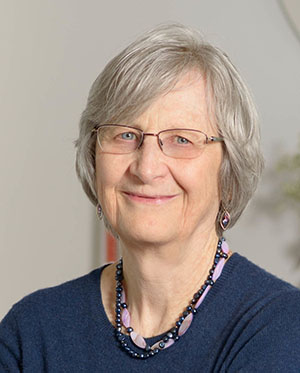When Laurel Thatcher Ulrich—in her 30s and the mother of five—was working towards her PhD in history at the University of New Hampshire, the native Idahoan chose a research project that now was near at hand: early American history.
GUEST LECTURES
Laurel Thatcher Ulrich will present “Curiosities: History in Odd Things,” part of the Humanities Center’s Public Lecture Series—this year on the theme of memory and forgetting—on November 16 at 5 p.m. in the Hawkins-Carlson Room at Rush Rhees Library.
She’ll also take part in “The Future(s) of Microhistory: A Symposium,” one of this year’s Humanities Projects. She’ll deliver the keynote lecture, “Reflections on Writing A Midwife’s Tale,” on November 17 at 5 p.m. in the Hawkins-Carlson Room at Rush Rhees Library. The event is free and open to the public; no registration is required.
Few scholars in the 1970s were writing about Puritan culture, and those who did had little interest in the lives of ordinary women. Witches, witch hunting, and religious dissenters were flashier subjects.
But Ulrich—now the 300th Anniversary University Professor at Harvard—has a habit of looking where others don’t. And when, in 1976, she published her first scholarly article, on Puritan funeral sermons for “virtuous” women, she included a sentence that has become a fixture in our visual landscape: “Well-behaved women seldom make history.”
A journalist came across the line in the 1990s and used it as an epigraph for her own book on American women. And the rest, as they say, is history. Today, the aphorism is found on everything from bumper stickers to coffee mugs to T-shirts. Its ubiquity challenges even Ulrich’s formidable powers of explanation.
“It’s astounding,” she says. But at the core of the line’s appeal, she thinks, is this: “History is essential to many movements for social change. If you believe that things have always been the way they are now, you don’t have a history—because history is the study of how things change over time.
“But if you can investigate history, and begin to rewrite history, then you have a different orientation toward the future. History is our job. If we just sit and passively accept our own circumstances, nothing will change. So: well-behaved women seldom make history.”
As a feminist scholar, Ulrich has made history herself. Her second book, A Midwife’s Tale: The Life of Martha Ballard, Based on Her Diary, 1785–1812 (Vintage, 1991), won the Pulitzer Prize in History—the first book of women’s history to receive the prize. Her material was an 18th-century diary housed at the Maine State Archives, a resource that historians before Ulrich had passed over as an object for serious scrutiny. From terse entries recorded over 27 years—“Calld from Mrs Howard to Mr McMasters to see their son William who is very low. Tarried there this night.”—by a woman for whom there was virtually no other historical record, Ulrich unspooled the complex story of a frontier community. Her book, the American Historical Association says, “showed scholars and general readers alike new ways of imagining the past.”
Ballard’s diary is full of references to the household production of cloth, and it occurred to Ulrich that there was a story to be told there, as well. She published The Age of Homespun: Objects and Stories in the Creation of an American Myth (Knopf, 2001), examining early American history through 14 domestic objects: not just fabric, but tools such as baskets and spinning wheels, and furniture, including an ornate 1715 cupboard for displaying textiles. When women handed down household goods to their daughters, there was no legal record. Histories of these objects “had to be teased out of provenance records in museums, where you could see where something came from and how it survived over time,” she says. “That taught me a lot about what I would call ‘female lines of inheritance.’”

“Odd things” have become a touchstone of Ulrich’s work. With a curator at Harvard’s art museum, she explored “all the strange stuff in the nooks and crannies” of the university’s many museums, an effort that resulted in the coauthored Tangible Things: Making History Through Objects (Oxford University Press, 2015). “We systematically went into every collection,” she says, asking curators what they had in their holdings “that doesn’t quite fit, or seems unusual.” The most unexpected find was a 120-year-old tortilla—a “surviving tortilla,” Ulrich laughingly calls it—kept in the museum’s economic botany collection. It was brought from Mexico to Harvard by 19th-century botanists who were investigating agricultural products.
“One of the exciting things about working with material objects is that they force you to look at ways of apprehending the world that you might not have thought of. So the tortilla, for example—as I explored that, I had to think about anthropology, botany, the economics of agricultural materials, and food, and ethnicity, and race. All of those things played a part in the story of this very odd survival.”
Ulrich’s new book is A House Full of Females: Plural Marriage and Women’s Rights in Early Mormonism, 1835–1870 (Knopf, 2017). A member of the Mormon community herself, she examines female activism—women secured the vote in Utah half a century before the passage of the 19th Amendment—and the marriage system, using artifacts such as diaries, ledgers, meeting notes, and quilts.
Ulrich’s most famous sentence has been interpreted as everything from a call to action to a declaration that it’s the rule breakers who get remembered. The “ambiguity of the slogan surely accounts for its appeal,” she writes in her book Well-Behaved Women Seldom Make History (Knopf, 2007), a series of essays reflecting on the catchphrase.
But history is made in many ways. “I don’t think it means, necessarily, running for office,” she says. “It could also mean studying the past. It could mean collecting documents. It could mean preserving tortillas.
“It could be any number of things.”



